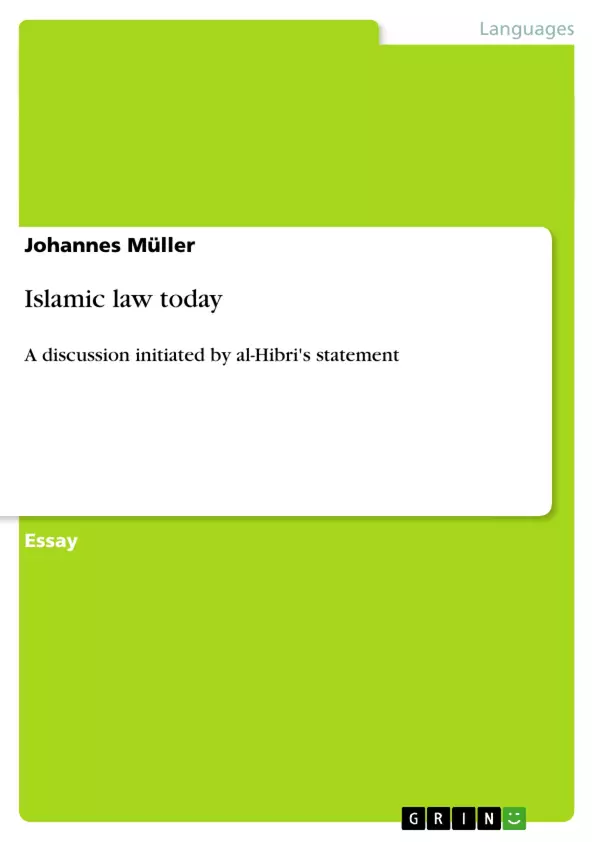"Each individual has direct access to the Quran and hadith and is in principle entitled to engage in ijtihad, so long as she has the requisite knowledge. Thus not only countries, but also individuals are entitled to their own jurisprudential choices." (al-Hibri in Muslim Womens Rights in the Global Village). This paper discusses al-Hibris statement on the position in Islamic law today.
Inhaltsverzeichnis (Table of Contents)
- Introduction
- 1. Al-Hibri's Statement in the Framework of Islamic Modernism
- 2. Theoretical Issues of al-Hibri's Approach
- 2.1 Who is Entitled to Perform Ijtihad?
- 2.2 Individual Ijtihad and the Notion of Community
- 2.3 Individual Ijtihad and Cultural Bias
- 3. The Practical Framework
- 3.1 Muslims in North America
- 3.2 North American Muslims as a Vanguard
- 3.3 General Considerations
- Conclusion
Zielsetzung und Themenschwerpunkte (Objectives and Key Themes)
This essay aims to analyze and critically evaluate al-Hibri's statement on the role of individual ijtihad in contemporary Islamic law, particularly in the context of North American societies. The essay explores the theoretical underpinnings of her approach, including its relationship to Islamic modernism, and examines its practical implications for the development and application of sharia in a globalizing world.
- The role of individual ijtihad in contemporary Islamic law
- The relationship between individual ijtihad and the notion of community in Islam
- The impact of cultural influences on individual interpretations of Islamic law
- The applicability of al-Hibri's approach to different social contexts, particularly in North America and Muslim states
- The challenges and limitations of individual ijtihad as a solution to the complexities of contemporary Islamic law
Zusammenfassung der Kapitel (Chapter Summaries)
- Introduction: The essay introduces al-Hibri's statement on the right of individuals to engage in ijtihad and outlines the key issues that will be explored. It also highlights the need to consider both the theoretical and practical implications of her approach.
- 1. Al-Hibri's Statement in the Framework of Islamic Modernism: This chapter discusses al-Hibri's statement within the broader context of Islamic modernism and its response to the challenges of globalization and cultural influences. It explores the history of Islamic law, the development of different schools of thought, and the emergence of modernist approaches.
- 2. Theoretical Issues of al-Hibri's Approach: This section examines the theoretical underpinnings of al-Hibri's approach. It raises questions about the concept of individual ijtihad, the role of community in Islamic law, and the potential for cultural bias in individual interpretations of Islamic law.
- 3. The Practical Framework: This chapter focuses on the practical implications of al-Hibri's approach. It discusses its applicability to the North American context and considers its transferability to Muslim states. It explores the challenges and opportunities of applying individual ijtihad in different social settings.
Schlüsselwörter (Keywords)
This essay primarily focuses on Islamic law, individual ijtihad, Islamic modernism, cultural influences, and the North American context. It explores the relationship between these concepts and their implications for the development and application of sharia in a globalizing world.
Frequently Asked Questions
What is al-Hibri's main argument regarding Ijtihad?
Al-Hibri argues that every individual with sufficient knowledge has direct access to the Quran and Hadith and is entitled to their own jurisprudential choices through ijtihad.
How does this approach relate to Islamic modernism?
It fits within the framework of Islamic modernism by responding to globalization and cultural influences, advocating for interpretations that address contemporary challenges.
What are the theoretical challenges of individual ijtihad?
The essay explores issues such as the definition of who is qualified to perform ijtihad, the potential for cultural bias, and how individual choice affects the sense of community in Islam.
Why is the North American context significant in this study?
The study examines North American Muslims as a potential "vanguard" for applying these modernist approaches in a practical, Western framework.
Can individual ijtihad be transferred to Muslim-majority states?
The practical framework of the essay discusses the transferability and limitations of applying individual jurisprudential choices in different social and state contexts.
- Quote paper
- Johannes Müller (Author), 2004, Islamic law today, Munich, GRIN Verlag, https://www.grin.com/document/72131



